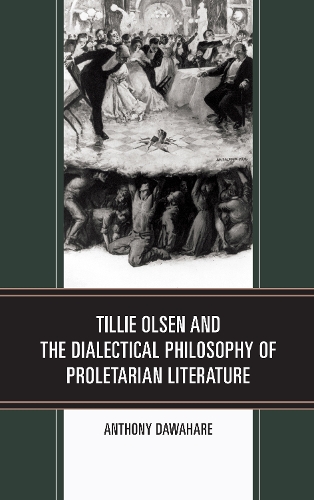
Tillie Olsen and the Dialectical Philosophy of Proletarian Literature
(Paperback)
Available Formats
Publishing Details
Tillie Olsen and the Dialectical Philosophy of Proletarian Literature
By (Author) Anthony Dawahare
Bloomsbury Publishing PLC
Lexington Books
11th August 2020
United States
Classifications
Professional and Scholarly
Non Fiction
Gender studies: women and girls
Literary studies: c 1900 to c 2000
Politics and government
813.54
Physical Properties
Paperback
148
Width 154mm, Height 223mm, Spine 11mm
236g
Description
Contrary to previous studies of Tillie Olsens writing, Tillie Olsen and the Dialectical Philosophy of Proletarian Literature analyzes the impact of one of the most important philosophies of the last century, dialectical materialism, on the form and content of Olsens fiction. By revealing the unconceptualized dialectics of Olsens work and its appreciation by scholars and casual readers, this study achieves a dialectical synthesis that incorporates and extends the insights of and about Olsen in terms of dialectical materialism. By foregrounding Olsens dialectical approach, it explains and largely resolves apparent contradictions between her Marxism and feminism; her depictions of class, race, and gender; the literature of her earlier and later periods; and her use of realist and modernist literary forms and techniques. Consequently, this project makes a case for the importance of Olsens Marxist education during the Red Decade of the 1930s and within the U.S. proletarian literary movement.
Reviews
Dawahare (California State Univ., Northridge) examines the work of proletarian writer Tillie Olsen (19122007) through the lens of dialectical materialism. He argues persuasively that although Olsen did not participate directly in the proletarian literary debates of the 1930s, as the daughter of socialists from pre-Soviet Russia she had been introduced to Marxist theoretical orientations, as he writes in chapter 2, and closely followed those debates in the major Marxist literary and cultural periodicals. In the introduction Dawahare explains the enormous and complicated topic of dialectical materialism as a historical method of analyzing how and why social change occurs, questions that he sees as central to Olsens fiction. He devotes chapter 3 to Tell Me A Riddle (1961), analyzing the stories in that work as both dialectical materialist metaphors and dialectical representations of working-class life in mid-century America. The title story, he asserts, focuses on the struggle between opposing forces of dialectical contradictions that cannot find resolution within the constraints of capitalism. Dawahare deftly draws on existing scholarship on Olsen, Marxism, and proletarian literature, along with archival sources and an interview he conducted with Olsen in 1992 to underscore Olsens engagement with Marxist ideas in her works.
Summing Up: Highly recommended. Graduate students, researchers, faculty. * CHOICE *
Anthony Dawahare brilliantly demonstrates the centrality of dialectical materialism not only to the methodology guiding Tillie Olsens writing but also to the proletarian literary movement as a whole. While full of incisive and original readings of Olsens oeuvre, this is far more than a single-author study; Dawahares firm grasp of fundamental principles of Marxist literary criticism supplies a model for analysis of a wide range of revolutionary texts aiming to portray what Olsen called the not-yet in the now. -- Barbara C. Foley, University of Rutgers-Newark
Anthony Dawahares book punctures a myth that only real men do Marxism. His subtle and intelligent appreciation of Tillie Olsens dialectical materialism is a significant advance in Olsen studies, and provides an exciting new key by which to read her work. The book is especially valuable for scholars assessing Olsens relationship to proletarian literature as a whole, and proletarian aesthetics in particular. A stirring, original work of scholarship. -- Bill V. Mullen, Purdue University
Dawahares book is guaranteed to make waves in proletarian literary studies not just because it takes a heterodox position on the continuing relevance of dialectical materialism and the wide purchase of Marxist social critique, but also because it manages to make a serious and substantial case for a new, more critical Marxist reading of Tillie Olsens fiction. -- Marcial Gonzlez, University of California, Berkeley
Tillie Olsens deep engagement with Marxism on a formal as well as thematic level has often been obscured by Olsens much-repeated criticism of the head boys of the US literary Left of the 1930s and 1940s. In this study, Anthony Dawahare shows the ways that Olsen was profoundly influenced by dialectical materialism, which is to say Marxist philosophy. He convincingly argues that this influence was not simply on the level of sentiment but was also structural. In this regard, Dawahare shows that Olsen was not isolated or singular, but part of a larger Marxist literary tradition. In short, Tillie Olsen and the Dialectical Philosophy of Proletarian Literature, illuminates both the work of Olsen and the Marxist current of US literature in new ways. -- James Smethurst, University of Massachusetts, Amherst
Author Bio
Anthony Dawahare is professor of English at California State University, Northridge.
